International Toy Fair Nuremberg 2009
Internationale Spielwarenmesse Nürnberg 2009
| x |
|
|
|
|
|
|
|
|
|
|
|
|
|
|
|
|
|
|
|
|
|
|
|
|
|
|
|
|
|
|
|
|
|
| Kosmos |
|
| x |
|
|
|
|
|
|
|
|
|
|
|
|
|
|
|
|
|
|
|
|
|
|
|
|
|
|
|
|
|
|
|
|
|
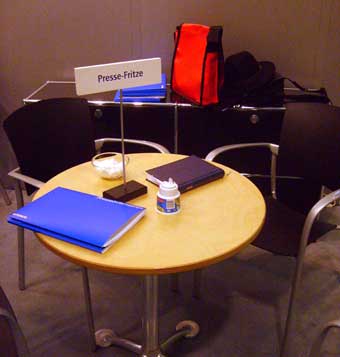 |
|
Will this chair be empty next year? The outstanding press abstracts Fritz 'Presse-Fritze' Gruber releases for every Kosmos game are difficult to match. Maybe negotiations do miracles.
We only say: Keep. Him. In. |
|
| x |
|
|
|
|
|
|
|
|
|
|
|
|
|
|
|
|
|
|
|
|
|
|
|
|
|
|
|
|
|
|
|
|
|
| 'Einfach Genial' becomes 'Genial Spezial', and goes up in height as there are two different towers involved. Players still try to collect as many points in all four symbol colours. Points are given when a player connects two or more towers with his tiles, with the larger towers also giving special points. |
|
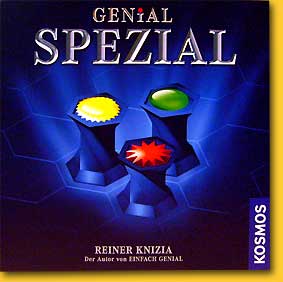 |
| x |
|
|
|
|
|
|
|
|
|
|
|
|
|
|
|
|
|
|
|
|
|
|
|
|
|
|
|
|
|
|
|
|
|
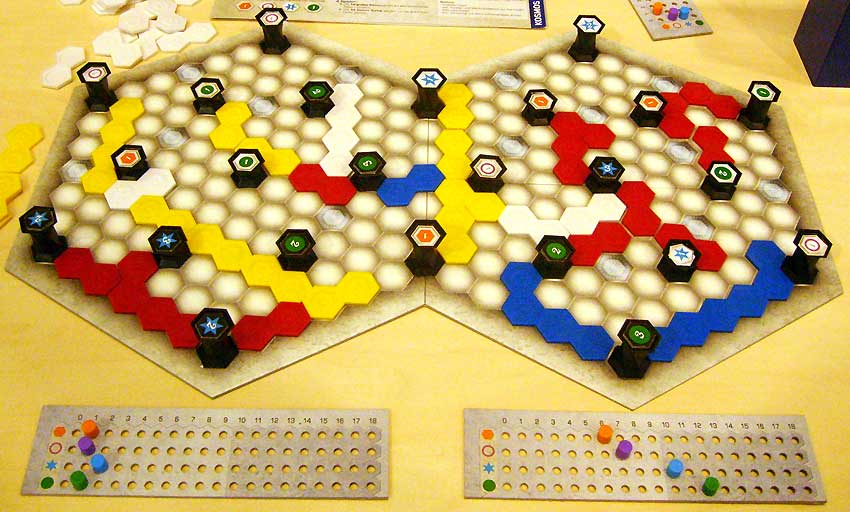 |
| x |
|
|
|
|
|
|
|
|
|
|
|
|
|
|
|
|
|
|
|
|
|
|
|
|
|
|
|
|
|
|
|
|
|
| In a turn, a player places one of his two-hex tiles on an empty space on the board. He will try to connect two or more towers, as this brings him as many points for a colour as stated on the coloured chips on the tower. When scored, the chips are turned on their black side that has a different scoring. New chains will score better than enlarging an existing one as this will only score for the new connected tower. |
|
| x |
|
|
|
|
|
|
|
|
|
|
|
|
|
|
|
|
|
|
|
|
|
|
|
|
|
|
|
|
|
|
|
|
|
 |
|
| x |
|
|
|
|
|
|
|
|
|
|
|
|
|
|
|
|
|
|
|
|
|
|
|
|
|
|
|
|
|
|
|
|
|
| There are bonus fields which advance any one colour 1 space on the score track when a tile is placed over them. Connecting the large towers gives a bonus of one point in every colour for each large tower in the chain, which can be very rewarding. |
|
| x |
|
|
|
|
|
|
|
|
|
|
|
|
|
|
|
|
|
|
|
|
|
|
|
|
|
|
|
|
|
|
|
|
|
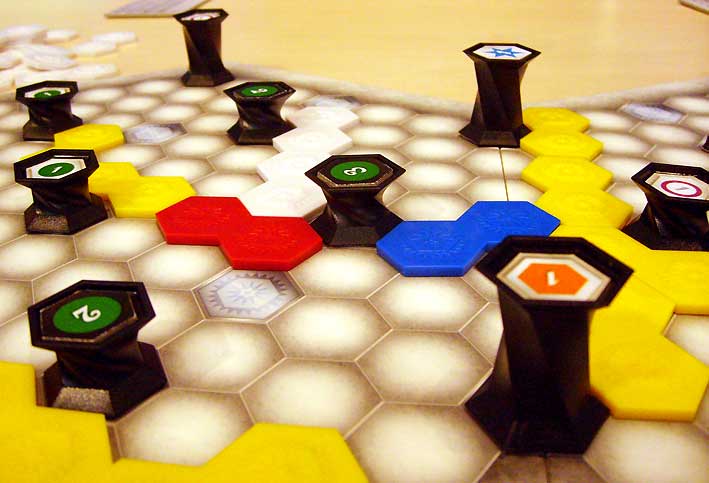 |
| x |
|
|
|
|
|
|
|
|
|
|
|
|
|
|
|
|
|
|
|
|
|
|
|
|
|
|
|
|
|
|
|
|
|
The game ends after 20 rounds when all players have placed their tiles. Each player's weakest colour on his score track is his score, with the highest score being victorious.
Genial Spezial, Reiner Knizia, Kosmos, 2009 - 2 to 4 players, 10 years and up, 40 minutes |
|
| xx |
|
|
|
|
|
|
|
|
|
|
|
|
|
|
|
|
|
|
|
|
|
|
|
|
|
|
|
|
|
|
|
|
|
| xx |
|
|
|
|
|
|
|
|
|
|
|
|
|
|
|
|
|
|
|
|
|
|
|
|
|
|
|
|
|
|
|
|
|
| xx |
|
|
|
|
|
|
|
|
|
|
|
|
|
|
|
|
|
|
|
|
|
|
|
|
|
|
|
|
|
|
|
|
|
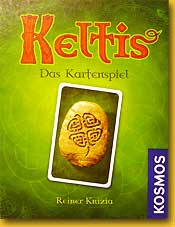 |
|
The card game from the card game, eh, what? This is how marketing goes, we don't blame anybody. After receiving the 'Spiel des Jahres' award, who at marketing would try his hands on 'Lost Cities' and say to the retail buyer this is actually the same, but somewhat different? So it had to be a new card game, where this merely has the added value of a variant; but who cares?
Keltis - Das Kartenspiel, Reiner Knizia, Kosmos, 2009 - 2 to 4 players, 8 years and up, 15-30 minutes |
|
| xx |
|
|
|
|
|
|
|
|
|
|
|
|
|
|
|
|
|
|
|
|
|
|
|
|
|
|
|
|
|
|
|
|
|
Who needs cards; stones are the thing!
Every turn, players flip a stone tile to its face up side. They have to decide whether they continue a path of stones, or simply leave it at its position. Instead of flipping a new stone tile, players may decide to take one that is already flipped. The larger the path of stones, the more points a player scores. And don't forget to collect wishing stones; otherwise you get a minus score! Sounds familiar? |
|
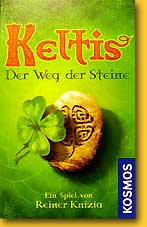 |
xx |
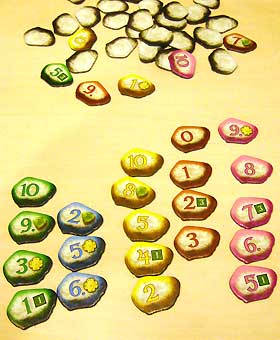 |
|
| xx |
|
|
|
|
|
|
|
|
|
|
|
|
|
|
|
|
|
|
|
|
|
|
|
|
|
|
|
|
|
|
|
|
|
| Keltis - Der Weg der Steine, Reiner Knizia, Kosmos, 2009 - 2 to 4 players, 7 years and up, 15 minutes |
|
| xx |
|
|
|
|
|
|
|
|
|
|
|
|
|
|
|
|
|
|
|
|
|
|
|
|
|
|
|
|
|
|
|
|
|
| xx |
|
|
|
|
|
|
|
|
|
|
|
|
|
|
|
|
|
|
|
|
|
|
|
|
|
|
|
|
|
|
|
|
|
| xx |
|
|
|
|
|
|
|
|
|
|
|
|
|
|
|
|
|
|
|
|
|
|
|
|
|
|
|
|
|
|
|
|
|
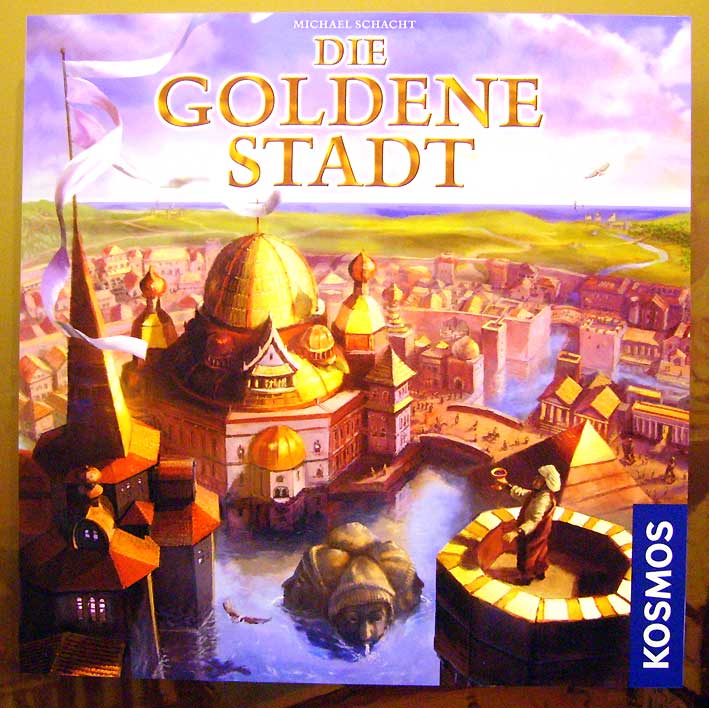 |
| xx |
|
|
|
|
|
|
|
|
|
|
|
|
|
|
|
|
|
|
|
|
|
|
|
|
|
|
|
|
|
|
|
|
|
The game is about a city in which trade certificates can be get; get the most of them and you stand a fair chance of winning. With eighteen traders, each player tries to move its traders to positions where they can start shops. These shops enable a player to collect various items such as gold, concession cards, or goods.
Up to two shops can be opened in a round, but any new shop has to be adjacent to an already existing shop; it also costs two terrain cards of the concerning area.
On positions that show a question mark, players may take a bonus card from a deck that can bring points at game end. |
|
| xx |
|
|
|
|
|
|
|
|
|
|
|
|
|
|
|
|
|
|
|
|
|
|
|
|
|
|
|
|
|
|
|
|
|
x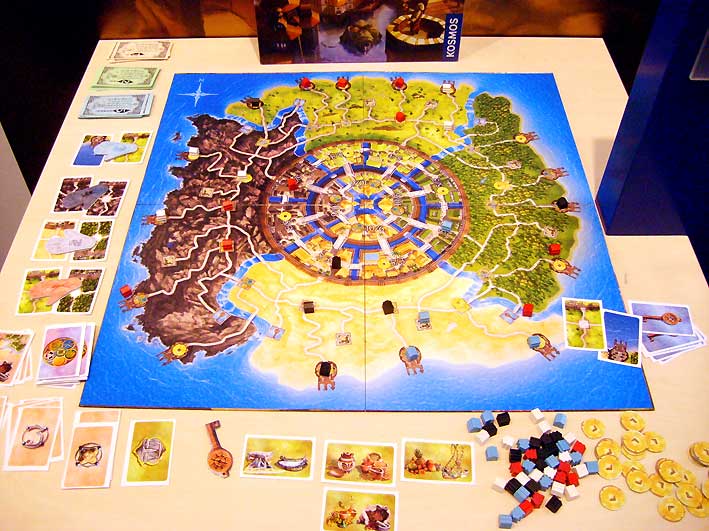 |
| xx |
|
|
|
|
|
|
|
|
|
|
|
|
|
|
|
|
|
|
|
|
|
|
|
|
|
|
|
|
|
|
|
|
|
| The first player who is able to bring a trader into the heart of the city, collects ten trade certificates and a concession card; the second player gets six trade certificates. Ships are needed to bring these traders in, and players will try to position their traders to positions on the board where this is possible. Players who did not get to the inner circle of the city will have weigh their chances in the outer circle. Chances are that they will get five trade certificates if they succeed. But these are the big fish; in the course of the game there are several scores: for goods, the four quarters, and the river, and these are scored at the end of each round. |
|
| xx |
|
|
|
|
|
|
|
|
|
|
|
|
|
|
|
|
|
|
|
|
|
|
|
|
|
|
|
|
|
|
|
|
|
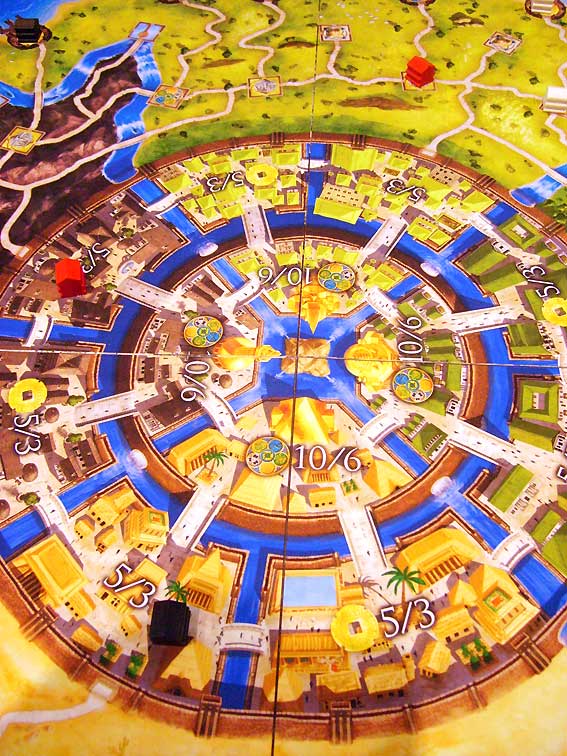 |
|
| xx |
|
|
|
|
|
|
|
|
|
|
|
|
|
|
|
|
|
|
|
|
|
|
|
|
|
|
|
|
|
|
|
|
|
Players move their traders by means of socalled concession cards which in fact are terrain cards; terrain cards can be obtained at the beginning of each round; four pairs of cards are placed in a window, and the first player takes his pick by placing his diplomat tile on the pair of cards of his choice. Players can pay for and expel such a diplomat if they want this set of cards for themselves.
The game mostly ends when a player has placed all his traders on the board; the value of the trade certificates are added, and any points acquired at the question mark fields.
Die Goldene Stadt, Michael Schacht, Kosmos, 2009 - 2 to 4 players, 10 years and up, 60 minutes |
|
| xx |
|
|
|
|
|
|
|
|
|
|
|
|
|
|
|
|
|
|
|
|
|
|
|
|
|
|
|
|
|
|
|
|
|
| xx |
|
|
|
|
|
|
|
|
|
|
|
|
|
|
|
|
|
|
|
|
|
|
|
|
|
|
|
|
|
|
|
|
|
| xx |
|
|
|
|
|
|
|
|
|
|
|
|
|
|
|
|
|
|
|
|
|
|
|
|
|
|
|
|
|
|
|
|
|
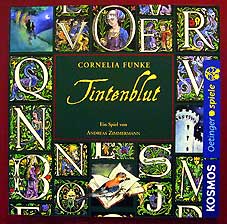 |
|
A movie based on a play - 'Glengary Glenn Ross', a movie based on a book - 'The Talented Mister Ripley'; well, why not a game on a book? 'Tintenblut' might not be as famous as the abovementioned, but the book has had high sales in Germany so it is not strange that Kosmos turned it into a boardgame, just as it did with its predecessor 'Tintenherz'. |
|
| xx |
|
|
|
|
|
|
|
|
|
|
|
|
|
|
|
|
|
|
|
|
|
|
|
|
|
|
|
|
|
|
|
|
|
Players collect experiences, preferably in the right mix. On their way through the Tintenblut world they encounter good and bad experiences. When they are alone on a location, they have different experiences than when they share it with others who also are there.
Players travel with travel cards, and at the end of their turn each player can exchange his experiences for points; having the required mix of experiences bring more points. |
|
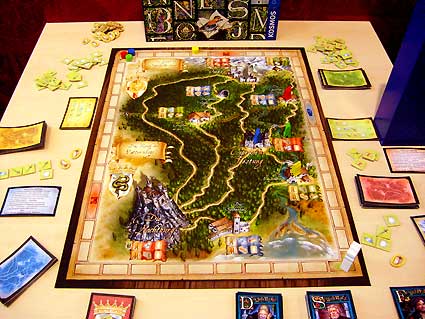 |
| xx |
|
|
|
|
|
|
|
|
|
|
|
|
|
|
|
|
|
|
|
|
|
|
|
|
|
|
|
|
|
|
|
|
|
 |
|
After each turn, the player who has played the card with the highest evil number, has to take the upper card of the Evil Card Deck. This way, some or the other player will have one or more of these cards in front of him. At a certain event, the player with the most of these cards will have to discard half of his experience points and supply, but may discard all his Evil cards.
The game ends when a player has reached the last position on the score track; the round is played to an end and a last round played. Whoever is ahead after this round has won.
Tintenblut, Andreas Zimmerman, Kosmos, 2009 - 2 to 4 players, 10 years and up, 40-60 minutes |
|
| xx |
|
|
|
|
|
|
|
|
|
|
|
|
|
|
|
|
|
|
|
|
|
|
|
|
|
|
|
|
|
|
|
|
|
| xx |
|
|
|
|
|
|
|
|
|
|
|
|
|
|
|
|
|
|
|
|
|
|
|
|
|
|
|
|
|
|
|
|
|
| xx |
|
|
|
|
|
|
|
|
|
|
|
|
|
|
|
|
|
|
|
|
|
|
|
|
|
|
|
|
|
|
|
|
|
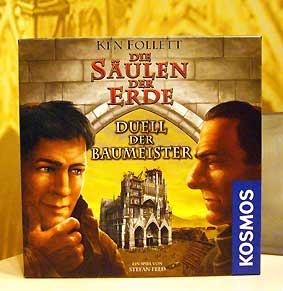 |
|
For players not satisfied with the possibility of playing 'Pillars of the Earth' with two, there now is a card game on the subject solely for two players - maybe this exclusivity helps them to accept a superb game; yes, again on a succesful book.
One player tries to erect a cathedral, while the other is in charge of building a fortress, an element that also seems to be part of the book; the one who succeeds first in erecting his building has won the game.
Each of the two buildings consists of three sections/cards; each of those sections require a different combination of materials. Action cards enable players to get to construction materials; other action cards upgrade these materials, such as iron into bells, sand into cement or wool into cloth. |
|
| xx |
|
|
|
|
|
|
|
|
|
|
|
|
|
|
|
|
|
|
|
|
|
|
|
|
|
|
|
|
|
|
|
|
|
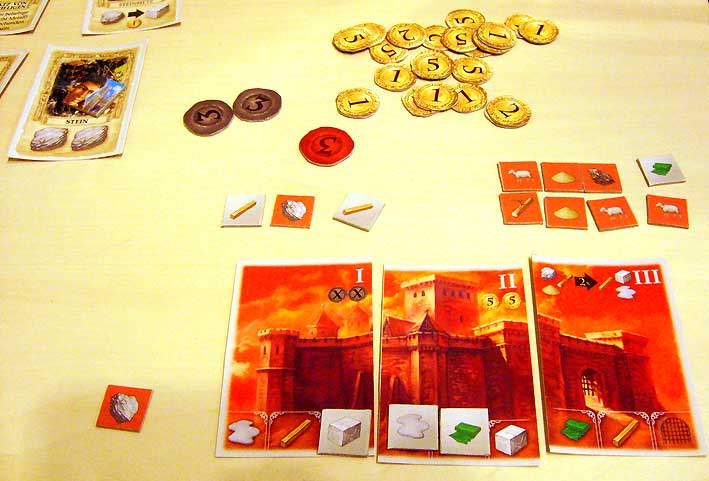 |
| xx |
|
|
|
|
|
|
|
|
|
|
|
|
|
|
|
|
|
|
|
|
|
|
|
|
|
|
|
|
|
|
|
|
|
| The action cards come in three different colours; the grey ones can be used by both players. Most of these cards deal with the acquirement of building materials and their upgrade through craftsmen, but also players can use these cards for gold and seals. Red and blue cards can only be used by the player playing this colour. |
|
| xx |
|
|
|
|
|
|
|
|
|
|
|
|
|
|
|
|
|
|
|
|
|
|
|
|
|
|
|
|
|
|
|
|
|
xx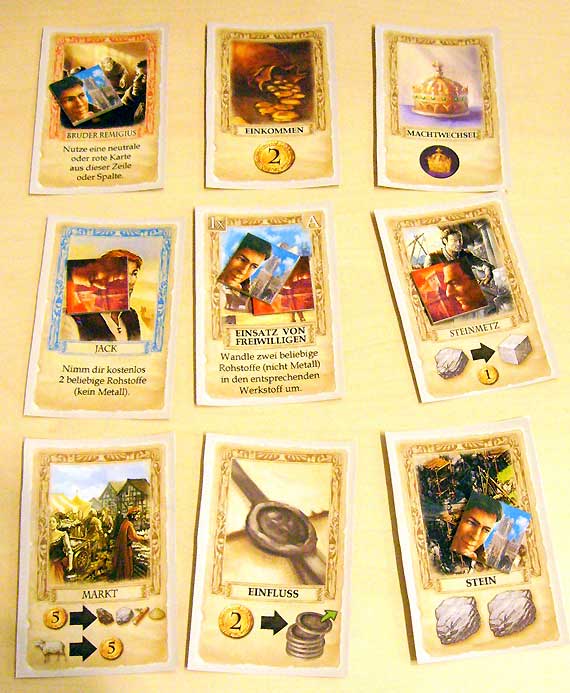 |
|
| xx |
|
|
|
|
|
|
|
|
|
|
|
|
|
|
|
|
|
|
|
|
|
|
|
|
|
|
|
|
|
|
|
|
|
At the beginning of a round, nine cards are placed in a grid of three by three. Cards may show a variety of materials or gold, privileges or upgrades. One player starts and chooses a row or column of cards. The other player has to either choose the row or column - whichever the other player did not choose - or choose a diagonal. Either way, one card is subject to both player's choices, and thus a battle is inevitable.
The batlle is done with seals; a player has one or more neutral seals as well as a personal one. Each seal has two sides with different values; the battle is done in throwing the seal in the air, and hope that the higher value will end up face up on the table - or any other surface. The winner takes - no not all - his three cards , the other player now only has two cards he may take. |
|
| xx |
|
|
|
|
|
|
|
|
|
|
|
|
|
|
|
|
|
|
|
|
|
|
|
|
|
|
|
|
|
|
|
|
|
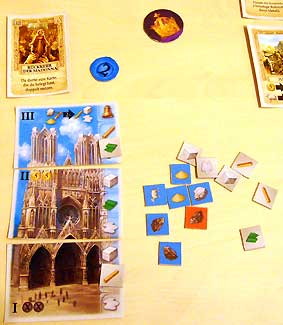 |
|
When a player has the required materials, he has to pay for the use of it in gold. Using additional materials each time costs him double the amount of gold.
The game ends immediately when a player has completed his building - cathedral or fortress - by placing his third section.
Die Säulen der Erde - Duell der Baumeister, Stefan Feld, Kosmos, 2009 - 2 players, 10 years and up, 45 minutes |
|
| xx |
|
|
|
|
|
|
|
|
|
|
|
|
|
|
|
|
|
|
|
|
|
|
|
|
|
|
|
|
|
|
|
|
|
| x |
|
|
|
|
|
|
|
|
|
|
|
|
|
|
|
|
|
|
|
|
|
|
|
|
|
|
|
|
|
|
|
|
|
| x |
|
|
|
|
|
|
|
|
|
|
|
|
|
|
|
|
|
|
|
|
|
|
|
|
|
|
|
|
|
|
 |
|
|
|
|
|
|
|
|
|
|
|
|
|
|
|
|
|
|
|
|
|
|
|
|
|
|
|
|
|
|
|
|
 |
|
|
|
|
|
|
|
|
|
|
|
|
|
|
|
|
|
|
|
|
|
|
|
|
|
|
|
|
|
|
|
|
 |
|
|
|
|
|
|
|
|
|
|
|
|
|
|
|
|
|
|
|
|
|
|
|
|
|
|
|
|
|
|
|
|
 |
|
|
|
|
|
|
|
|
|
|
|
|
|
|
|
|
|
|
|
|
|
|
|
|
|
|
|
|
|
|
|
|
 |
|
|
|
|
|
|
|
|
|
|
|
|
|
|
|
|
|
|
|
|
|
|
|
|
|
|
|
|
|
|
| x |
|
|
|
|
|
|
|
|
|
|
|
|
|
|
|
|
|
|
|
|
|
|
|
|
|
|
|
|
|
|
|
|
|
 |
|
|
|
|
|
|
|
|
|
|
|
|
|
|
|
|
|
|
|
|
|
|
|
|
|
|
|
|
|
|
|
|
|
|
|
|
|
|
|
|
|
|
|
|
|
|
|
|
|
|
|